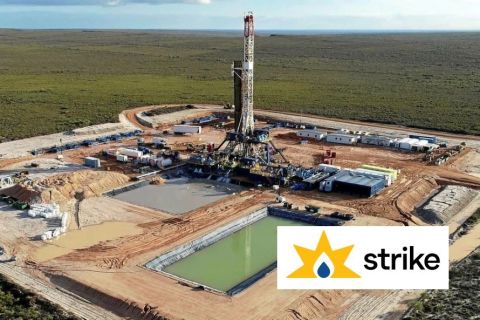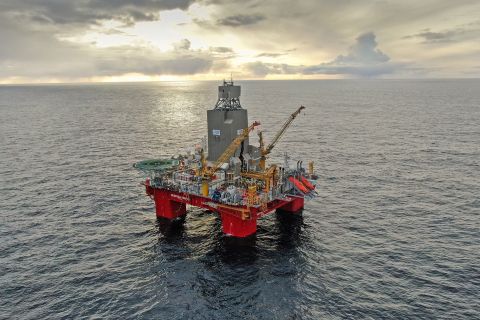U.S. oil and gas producers will see some changes from Washington, D.C., no matter if George W. Bush or Al Gore is inaugurated next year, according to Deutsche Banc Alex. Brown's energy analysts. "While Bush would attempt to loosen the current crisis through supply-side initiatives, Gore would try to lessen U.S. dependency on foreign oil by reducing demand through promotion of conservation and alternative energy sources," the analysts wrote on Election Day. Supply-demand fundamentals will return to normal in mid-2001, putting the issue of price aside in Americans' minds, they expect. But the election's outcome could affect the U.S. energy industry longer-term, they add. Something will have to give, according to Larry Nichols, president and chief executive officer of Oklahoma City-based Devon Energy Corp. He addressed fellow producers at the recent Independent Petroleum Association of America's annual meeting in San Antonio. "The greatest challenge we have today is the political environment in which we work...We're going to have energy shortages in this country. We're going to have higher [fuel] prices." Greg Armstrong, chief executive officer of Houston-based producer Plains Resources Inc. said government intervention in U.S. energy costs and consumption could be on its way. The most real risk to producers' bottom line right now is a decline in demand due to conservation. "We are fat in terms of our energy use," he said. Luis Guisti, senior advisor, Center for Strategic & International Studies, and former chief executive officer of PDVSA, the Venezuelan national oil company, told the IPAA members, "You should probably have an energy policy." The DBAB analysts say a Bush presidency will reopen for drilling a great deal of the public land that the Clinton administration has enrolled in protected status. The IPAA has lobbied for the reopening. Nichols of Devon Energy said, in San Antonio, "If we don't have access to federal lands, we won't have [sufficient oil and gas supply]." The DBAB analysts project, based on campaign statements and literature, a Bush administration will open the Arctic National Wildlife Refuge (ANWR) to drilling on the coastal plain; allow drilling offshore Florida and California; allocate some royalties from ANWR exploration and production to the study of alternative-fuel sources; maintain the ethanol tax credit; and ease the regulatory process for building new refineries and pipelines. They expect a Gore administration will emphasize demand management and the environment; not open ANWR to drilling and production; allow drilling for natural gas offshore western Florida, in the Destin Dome area; support continued prohibition of new drilling elsewhere offshore the U.S.; provide tax credits for the purchase of hybrid, electric and fuel-cell vehicles, energy efficient trucks, and energy efficient homes and weatherization; and focus on accelerating reductions of sulfur content in fuels, and on reducing pollution. Gore may be more successful at opening offshore western Florida to drilling. "Such direction under Bush would seem blatantly pro oil, while Gore could package the initiative around the environmental friendliness of new natural gas supplies," the analysts say. This drilling will likely be of the controversial Destin Dome, which is south of Pensacola, that is estimated to contain 24 trillion cubic feet of gas. Meanwhile, Bush may forego relief to U.S. producers in favor of increased supply from the Middle East, and new supply from such sanctioned places as Iran and Libya, "due simply to the geology of the mature U.S. hydrocarbon basins, in our view," the analysts report. The DBAB analysts conclude, "Regardless of who is elected, we think it is imperative that immediate attention be given to extreme infrastructure tightness before the new administration turns toward more abstract, longer-term policies." Public sentiment toward energy producers must change, Nichols said. "You cannot love employment and hate employers. You cannot love low oil and gas prices and hate oil companies."
Recommended Reading
US Drillers Add Oil, Gas Rigs for First Time in Five Weeks
2024-04-19 - The oil and gas rig count, an early indicator of future output, rose by two to 619 in the week to April 19.
Strike Energy Updates 3D Seismic Acquisition in Perth Basin
2024-04-19 - Strike Energy completed its 3D seismic acquisition of Ocean Hill on schedule and under budget, the company said.
Santos’ Pikka Phase 1 in Alaska to Deliver First Oil by 2026
2024-04-18 - Australia's Santos expects first oil to flow from the 80,000 bbl/d Pikka Phase 1 project in Alaska by 2026, diversifying Santos' portfolio and reducing geographic concentration risk.
Iraq to Seek Bids for Oil, Gas Contracts April 27
2024-04-18 - Iraq will auction 30 new oil and gas projects in two licensing rounds distributed across the country.
Vår Energi Hits Oil with Ringhorne North
2024-04-17 - Vår Energi’s North Sea discovery de-risks drilling prospects in the area and could be tied back to Balder area infrastructure.



